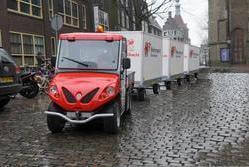Utrecht stimulates clean transport of construction materials

The City of Utrecht would like to realise a construction logistics centre to contain the negative impacts of heavy construction traffic in the inner city. The existing innovative city distribution system Cargohopper can play a role in this. Together with a large Dutch construction company, Cargohopper is now starting a pilot project around the construction of a new Music Centre, situated next to Utrecht’s central train station.
Cargohopper is a narrow, 16 metre long, solar paneled vehicle that already is a great success in the inner city. Together with the large construction company Heijmans, Cargohopper is now starting a pilot project around the construction of the new Music Centre Vredenburg, situated next to Utrecht’s central train station. The supply of materials needed for the finalisation of this large construction project will be bundled from the distribution centre that is located at the industrial area Lage Weide. Moreover, the Cargohopper site will be used as a buffer location for trucks.Next to the pilot on construction materials, Cargohopper is also continuing its regular activities. Between April 2009 and August 2010 the vehicle has made 10,000 trips, delivering over 5,000 packages. This translates in the saving of 1,500 trips and over 112,000 kilometers of a regular van between Lage Weide and the city centre of Utrecht - a reduction of around 33 tons of CO2. Cargohopper is not a transport medium on its own, but a last critical link in an existing large logistics chain. It is designed for the delivery of packages, not for pallets. Goods are collected outside the city in the large distribution centre. Then they are transported by regular truck to the transshipment area at the border of the inner city. There, the goods are loaded on the Cargohopper and rolled into the pedestrian zone: from there the delivery to the shops starts. It is very effective because Cargohopper never leaves its ‘natural habitat’ and the reloading is done within 10 minutes. Once empty, it collects dry carton, paper and empty packaging from shops for recycling. It is a clean, quiet and fast system. Due to its success, other Dutch and Belgium cities are starting to copy the “Utrecht model”, where the city stimulates and facilitates innovative developments of private companies.
Author: Mark Degenkamp









